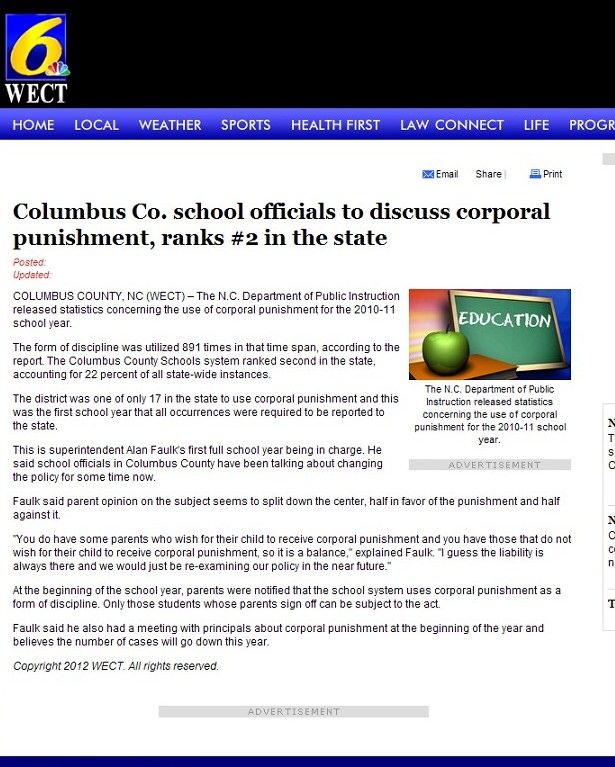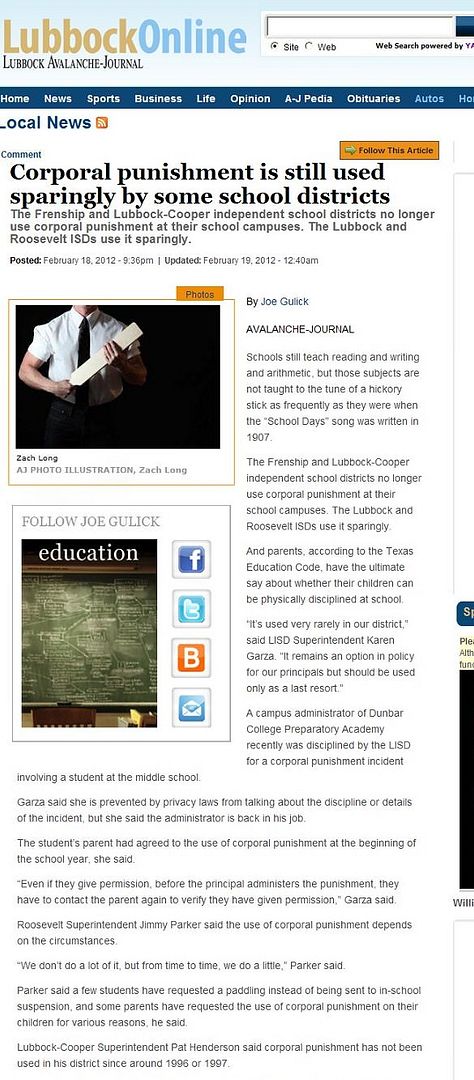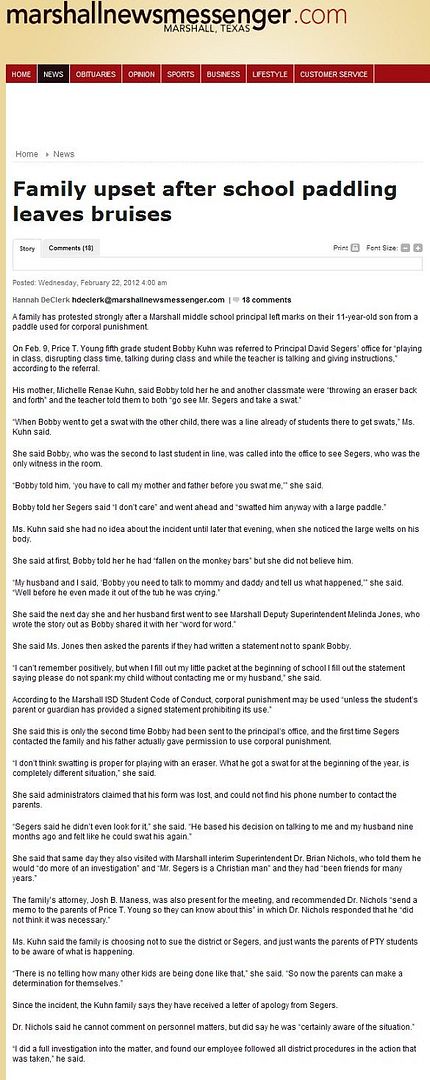Corpun file 23886 at www.corpun.com

wect.com (WECT TV6), Wilmington, N. Carolina, 2 February 2012
Columbus Co. school officials to discuss corporal punishment, ranks #2 in the state
 Click to enlarge |
COLUMBUS COUNTY, NC (WECT) -- The N.C. Department of Public Instruction released statistics concerning the use of corporal punishment for the 2010-11 school year.
The form of discipline was utilized 891 times in that time span, according to the report. The Columbus County Schools system ranked second in the state, accounting for 22 percent of all state-wide instances.
The district was one of only 17 in the state to use corporal punishment and this was the first school year that all occurrences were required to be reported to the state.
This is superintendent Alan Faulk's first full school year being in charge. He said school officials in Columbus County have been talking about changing the policy for some time now.
Faulk said parent opinion on the subject seems to split down the center, half in favor of the punishment and half against it.
"You do have some parents who wish for their child to receive corporal punishment and you have those that do not wish for their child to receive corporal punishment, so it is a balance," explained Faulk. "I guess the liability is always there and we would just be re-examining our policy in the near future."
At the beginning of the school year, parents were notified that the school system uses corporal punishment as a form of discipline. Only those students whose parents sign off can be subject to the act.
Faulk said he also had a meeting with principals about corporal punishment at the beginning of the year and believes the number of cases will go down this year.
Copyright 2012 WECT. All rights reserved.
Corpun file 23887 at www.corpun.com

11alive.com (WXIA-TV 11 News), Atlanta, Georgia, 6 February 2012
Corporal punishment legal in Ga. schools
By Julie Wolfe
ATLANTA -- One hundred and fifty years ago, the first state in the union outlawed corporal punishment in schools.
Today, 30 states have outlawed the practice of paddling, spanking, and hitting children as a form of discipline. Georgia is not one of them.
11Alive News filed a Freedom of Information Act with the State Board of Education. It uncovered 21,792 incidents of corporal punishment occurred in the 2010-2011 school year.
"The specific, personal stories that you hear can make you cry, can make you sad -- a lot of damage done to a lot of children," Debbie Seagraves, director of the Georgia chapter of the ACLU, said. The ACLU has met with families affected by extreme cases of corporal punishment. Some of their stories have stuck with Seagraves.
"I remember this one where a child was held down and beaten with a wooden board. The skin was broken, the tailboard was broken, and he was hospitalized. These are real stories," she said. "And understand, when we talk about corporal punishment, we're talking about any punishment that is designed to cause pain. Pain as a deterrent."
Georgia law, few guidelines
The Georgia law sets few guidelines, turning over complete control to local school boards. The Georgia law reads:
"All area, county, and independent boards of education shall be authorized to determine and adopt policies and regulations relating to the use of corporal punishment by school principals and teachers employed by such boards."
And then in Section 20-2-731 lays out some general guidelines, including the following:
(1) "Corporal punishment shall not be excessive or unduly severe".The law gives no specifics about what excessive or unduly severe means or defines what level of corporal punishment is appropriate.
(2) "Corporal punishment should never be used as a first line of punishment." Every school district I spoke with in researching this story quoted this as part of their policy.
(3) "Must be administered in the presence of a principal or assistant principal, or the designee". Some school districts, but NOT ALL, told me they SOMETIMES used a designee to make sure a female administrator paddled a female student. This was not always the case.
(4) "The principal or teacher who administered corporal punishment must provide the child's parent, upon request, a written explanation of the reasons for the punishment"
(5) A doctor's note can excuse a child from corporal punishment
Georgia law allows each school board to decide if they will allow corporal punishment within their school district, but even within school districts, how the policy is implemented varies greatly from school to school.
Each individual principal can decide whether to ban the practice from his or her own school. Several superintendents told me even through their school boards voted to allow the practice, they had some principals who decided not to allow corporal punishment in their schools.
Also, while each district passed general policies that mirrored the state law, none had written, specific rules about exactly how to implement corporal punishment.
Laurens County reported 1,761 incidents of corporal punishment in the 2010-2011 school year, the highest number in the state. Schools Superintendent Jerry Hatcher pointed to the size of the county as part of the reason for those numbers in a phone interview. The rural middle Georgia county has 6,000 students.
When asked if they had any specific rules about what kind of object they used for paddling, how many times, or where to hit, Hatcher said no, but admitted they did not paddle students younger than Pre-K or "swat them more than three times."
Corporal punishment distribution
Counties surrounding Atlanta reported zero incidents of corporal punishment. Just outside that Metro circle, the numbers jump.
In Polk County, we found something unusual: 212 incidents of corporal punishment reported less than 90 minutes from Atlanta. More than half were in Rockmart High School.
The explanation: students asked for it in lieu of other discipline.
Greg Teems is the director of student services for Polk County. "It's not the assigned punishment. This is a student that had an infraction that was going to go to ISS for 2 or 3 days or go home for OSS and then either a student will request corporal punishment or a parent will," he said. "I think they were very accommodating with the parental requests for corporal punishment. I do know, I've checked data so far this year and it's flipped in the opposite direction, mainly because they're just not as willing to paddle this year. "
The Georgia law says any parent that sends in a doctor's note can have their child excused from corporal punishment. But in Polk County at the beginning of every year, a note goes home. Parents opt in or out.
"We're not going to do it if a parent says don't use corporal punishment on my child, than we're not going to use it," Polk County Schools Superintendent Marvin Williams said. "Some parents ask us to use corporal punishment."
Williams recalls times he had to send his own students for discipline while working as a teacher: "I think there are some students corporal punishment is effective. I think, as a dad, corporal punishment has been effective with me as a parent. I also think you can run a good school without corporal punishment."
Again, I asked him: "There are no rules that say use this
particular object?"
"No."
"This many times?"
"No."
"Anything like that?"
"No."
"I don't think there's an ambiguity of the definition," he said. "I think it's use that there might be some difference of opinion in the schools, but I have to rely on the principals and trust my principals to do the right thing in situations.
What it means for your child
Clinical Psychologist Dr. Cathy Blusiewicz says that's too much trust when it comes to your child.
"I just think there are too many unanswered questions. The situations are too varied," she said. She points to new research that shows corporal punishment does not work to curb bad behavior. Instead, taking away freedoms is more likely to teach children to model good behavior.
"Where else in our society do you get paddled for breaking a rule? I mean, if you break a driving law, you lose freedom," Dr. Blusiewicz said. "So why do we still have that idea for high school students or younger students to have that kind of discipline in the school system?"
There's another dynamic to consider. Can Georgia schools adopt anti-bullying messages while maintaining corporal punishment? Can a child do something wrong in the classroom and be physically punished and expected to deal with his or her problems in a non-violent way on the playground?
Dr. Blusiewicz says no. "There's a real conflict there," she said. "And we really need to ask ourselves as adults, do we want to be in the business of doing that of causing that kind of harm?"
Corporal punishment and the future
In 2011, Rep. Carolyn McCarthy (D-N.Y.) introduced a law that would stop federal funding to schools that allowed corporal punishment as a way to push a federal ban. The law found widespread support in online petitions, but little real support on Capitol Hill. It never became law, but it could be reintroduced in the future.
In Georgia, the focus remains on local control. According to the ACLU, 102 counties in Georgia still practice corporal punishment.
Copyright © 2012 WXIA-TV Atlanta, Pacific and Southern Company, Inc. All rights reserved.
Corpun file 23891 at www.corpun.com

bigcountryhomepage.com (KTAB-TV), Abilene, Texas, 8 February 2012
Big Country Schools Defend Corporal Punishment
By Josh Berry
It's rare to see corporal punishment anywhere outside the confines of a home. Even in some households it's considered taboo. The paddle is alive and well in multiple school systems around the Big Country, and they say it's here to stay.
The only times we usually hear the words corporal punishment
any more is through those 'when i was a kid' stories. The paddle
in certain situations is even synonymous with hazing. But when
you add a school, a principal and what may be a localized
culture, using a paddle to quote "bust" a kid, is just
the norm.
Dwinn Nanny, superintendent of Panther Creek ISD, has the paddle
sitting on his desk. Students there have the option: in-school
suspension, or the paddle. But quite often, it's not the student
requesting the paddle.
"Most of the time that I have to use the paddle it is at a
parents request and it's elementary," said Nanny.
Bill Faircloth is the principal at Brownwood High School and
claims the paddle, coupled with their disciplinary system, keeps
students in line.
"Paddlin' works here, but it only works if that's what the
parent wants," said Faircloth.
As long as the parents give the go ahead, the paddle is sometimes
preferred because it keeps the students in the classroom learning
rather than spending their days in suspension.
Brownwood High School doesn't depend on the paddle. Faircloth
only uses it just a few times in a year. It's the idea that it's
there along with other proven methods of punishment like
implementing their one-to-one policy and taking a student's laptop.
Both schools say they have great kids, but it would seem like
paddling is the easy way out, skirting more serious punishments
like in-school suspension. But, it isn't something the students
can take advantage of.
"You get to do it one time. Obviously if it happens again it
didn't work so we do something else," said Faircloth.
The schools say it's a group effort between parents and the
school, mixed with more traditional values.
"It takes a village to raise a child and I think a small
community like this, that's still the case," said Nanny.
The schools confirmed, the paddle, as part of a larger effort to
create a positive learning environment, is here to stay. But none
of it would be worth anything if it didn't start at home, which
is where the good behavior is created.
"Good parents, good kids, good school. What I do or what our
teachers do is only building on what's started at home,"
said Nanny.
The rules for paddling are very strict. The student requests it,
the parent has to approve it, and there has to be a witness.
![]() RELATED VIDEO CLIP
RELATED VIDEO CLIP
Four-minute news item from Abilene TV station KTAB (8 Feb 2012) of which the above text is an abbreviated summary. "Big Country" here apparently means Abilene and its surrounding rural areas. A school superintendent who keeps a paddle on display on top of his desk is interviewed. It appears that there is a strong local consensus in favour of keeping school CP, within a shared, traditional "small communities" culture in which parents and schools work together. A senior high-school student comments on camera that he prefers to get a paddling rather than have to do in-school suspension. However, students may choose CP only once (per semester, presumably).
HERE IS THE CLIP:
IMPORTANT: Copyright in this video material rests with the original copyright holders. This brief excerpt is reproduced under the "fair use" doctrine ![]() for private, non-profit, historical research and education purposes only. It must not be redistributed or republished in any commercial context.
for private, non-profit, historical research and education purposes only. It must not be redistributed or republished in any commercial context.
Corpun file 23911 at www.corpun.com
Avalanche-Journal, Lubbock, Texas, 19 February 2012
Corporal punishment is still used sparingly by some school districts
By Joe Gulick
 AJ PHOTO ILLUSTRATION, Zach Long |
Schools still teach reading and writing and arithmetic, but those subjects are not taught to the tune of a hickory stick as frequently as they were when the "School Days" song was written in 1907.
The Frenship and Lubbock-Cooper independent school districts no longer use corporal punishment at their school campuses. The Lubbock and Roosevelt ISDs use it sparingly.
And parents, according to the Texas Education Code, have the ultimate say about whether their children can be physically disciplined at school.
"It's used very rarely in our district," said LISD Superintendent Karen Garza. "It remains an option in policy for our principals but should be used only as a last resort."
A campus administrator of Dunbar College Preparatory Academy recently was disciplined by the LISD for a corporal punishment incident involving a student at the middle school.
Garza said she is prevented by privacy laws from talking about the discipline or details of the incident, but she said the administrator is back in his job.
The student's parent had agreed to the use of corporal punishment at the beginning of the school year, she said.
"Even if they give permission, before the principal administers the punishment, they have to contact the parent again to verify they have given permission," Garza said.
Roosevelt Superintendent Jimmy Parker said the use of corporal punishment depends on the circumstances.
"We don't do a lot of it, but from time to time, we do a little," Parker said.
Parker said a few students have requested a paddling instead of being sent to in-school suspension, and some parents have requested the use of corporal punishment on their children for various reasons, he said.
Lubbock-Cooper Superintendent Pat Henderson said corporal punishment has not been used in his district since around 1996 or 1997.
Removing it was one of the first major policy changes he recommended to the school board after becoming superintendent, Henderson said.
"As an assistant principal of another area school district, I saw it didn't work," he said. "Kids would get in trouble again and come back, and what do you do? Hit them harder?"
In talking to students about what they did and why they did it, Henderson found different reasons for their behavior. In the case of one girl student, he learned she was being sexually abused, he said.
Danny Miller, Frenship ISD director of student services, said corporal punishment has been barred by board policy since 2003.
"We use alternative forms of discipline. The question in corporal punishment is how functional it is in the school system," he said.
Garza noted school districts have to hold students accountable for bad behavior but said principals have other options to administer discipline.
Principals know the students and have relationships with parents and teachers, and each principal makes the decision about what disciplinary measures to use on his or her campus, Garza said.
Clinton Gill, organizational development specialist of the Texas State Teachers Association, said teachers haven't been allowed to use corporal punishment in Texas for many years.
"All of our administrative members, we encourage them to find other methods of disciplinary action because of legal issues, Gill said.
Bill Stubblefield, parent of a Dunbar student, said parents should take the responsibility to raise and discipline their children.
"I've always supported traditional handling of corporal punishment in schools, but now, with the way times have changed, it should be put into the hands of parents," he said.
Renee Swack, mother of a Coronado High School freshman, agreed. She noted kids who get in trouble at school have traditionally gotten in trouble at home as well.
"I'm not in favor of corporal punishment, Swack said. "That could create more problems for the school, and there is the question about what is over the limit."
Parker said Roosevelt administrators all have a small paddle. When paddlings are given, there is always a professional employee to witness it, he said, and female administrators paddle girl students.
Henderson said student discipline is a circumstance in which administrators at each school district must do what they think is best for that district.
At Lubbock-Cooper, disciplinary matters are dealt with quickly and firmly, he said. Disruptive students are removed from the learning environment.
Texas school districts have alternative discipline programs that begin with in-school suspension, which school officials call ISS.
Usually, in-school suspension consists of a room in the school where disciplined students go to do their school work with no communication with other students.
"This is usually short term, such as one to three days or one to five days," Parker said.
The next stage is expulsion to a Disciplinary Alternative Education Program (DAEP), which is a long-term punishment for more serious offenses. This is a mandatory punishment set by the state, Henderson said.
"In our case, (the DAEP) is in two portable buildings and for a long term — at least 30 days," Henderson said.
The most serious punishment, established by the Texas Legislature in 1995, is the Juvenile Justice Alternative Education Program.
 Click to enlarge |
"You can't expel them to the streets," Henderson said.
Counties with populations above 125,000 people are required to operate the alternative programs, Parker said. There are mandatory expulsion offenses to put students there, and those offenses don't have to happen at school, Parker said.
For the very serious offenses, corporal punishment is not an option, he said.
Corporal punishment from the Texas Education Code
"Corporal punishment" means the deliberate infliction of physical pain by hitting, paddling, spanking, slapping, or any other physical force used as a means of discipline. The term does not include physical pain caused by reasonable physical activities associated with athletic training, competition, or physical education or the use of restraint as authorized under Education Code 37.0021 [see FOF]. Education Code 37.0011(a)
If the board adopts a policy under Education Code 37.001(a)(8) under which corporal punishment is permitted as a method of student discipline, a district educator may use corporal punishment to discipline a student unless the student's parent or guardian or other person having lawful control over the student has previously provided a written, signed statement prohibiting the use of corporal punishment as a method of student discipline. Education Code 37.0011(b)
To prohibit the use of corporal punishment as a method of student discipline, each school year a student's parent or guardian or other person having lawful control over the student must provide a separate written, signed statement to the Board in the manner established by the Board. The student's parent or guardian or other person having lawful control over the student may revoke the statement provided to the Board at any time during the school year by submitting a written, signed revocation to the Board in the manner established by the Board. Education Code 37.0011(c)-(d)
Lubbock Avalanche-Journal © 2012. All Rights Reserved.
Corpun file 23921 at www.corpun.com
The Marshall News Messenger, Marshall, Texas, 22 February 2012
Family upset after school paddling leaves bruises
By Hannah DeClerk
The Marshall News Messenger
 Click to enlarge |
A family has protested strongly after a Marshall middle school principal left marks on their 11-year-old son from a paddle used for corporal punishment.
On Feb. 9, Price T. Young fifth grade student Bobby Kuhn was referred to Principal David Segers' office for "playing in class, disrupting class time, talking during class and while the teacher is talking and giving instructions," according to the referral.
His mother, Michelle Renae Kuhn, said Bobby told her he and another classmate were "throwing an eraser back and forth" and the teacher told them to both "go see Mr. Segers and take a swat."
"When Bobby went to get a swat with the other child, there was a line already of students there to get swats," Ms. Kuhn said.
She said Bobby, who was the second to last student in line, was called into the office to see Segers, who was the only witness in the room.
"Bobby told him, 'you have to call my mother and father before you swat me,'" she said.
Bobby told her Segers said "I don't care" and went ahead and "swatted him anyway with a large paddle."
Ms. Kuhn said she had no idea about the incident until later that evening, when she noticed the large welts on his body.
She said at first, Bobby told her he had "fallen on the monkey bars" but she did not believe him.
"My husband and I said, 'Bobby you need to talk to mommy and daddy and tell us what happened,'" she said. "Well before he even made it out of the tub he was crying."
She said the next day she and her husband first went to see Marshall Deputy Superintendent Melinda Jones, who wrote the story out as Bobby shared it with her "word for word."
She said Ms. Jones then asked the parents if they had written a statement not to spank Bobby.
"I can't remember positively, but when I fill out my little packet at the beginning of school I fill out the statement saying please do not spank my child without contacting me or my husband," she said.
According to the Marshall ISD Student Code of Conduct, corporal punishment may be used "unless the student's parent or guardian has provided a signed statement prohibiting its use."
She said this is only the second time Bobby had been sent to the principal's office, and the first time Segers contacted the family and his father actually gave permission to use corporal punishment.
"I don't think swatting is proper for playing with an eraser. What he got a swat for at the beginning of the year, is completely different situation," she said.
She said administrators claimed that his form was lost, and could not find his phone number to contact the parents.
"Segers said he didn't even look for it," she said. "He based his decision on talking to me and my husband nine months ago and felt like he could swat him again."
She said that same day they also visited with Marshall interim Superintendent Dr. Brian Nichols, who told them he would "do more of an investigation" and "Mr. Segers is a Christian man" and they had "been friends for many years."
The family's attorney, Josh B. Maness, was also present for the meeting, and recommended Dr. Nichols "send a memo to the parents of Price T. Young so they can know about this" in which Dr. Nichols responded that he "did not think it was necessary."
Ms. Kuhn said the family is choosing not to sue the district or Segers, and just wants the parents of PTY students to be aware of what is happening.
"There is no telling how many other kids are being done like that," she said. "So now the parents can make a determination for themselves."
Since the incident, the Kuhn family says they have received a letter of apology from Segers.
Dr. Nichols said he cannot comment on personnel matters, but did say he was "certainly aware of the situation."
"I did a full investigation into the matter, and found our employee followed all district procedures in the action that was taken," he said.
© Copyright 2012, The Marshall News Messenger, Marshall, TX.
Corpun file 23910 at www.corpun.com
The McDowell News, North Carolina, 24 February 2012
McDowell schools No. 3 in paddlings
By Landdis Hollifield
McDowell News
 Click to enlarge |
MCDOWELL COUNTY, N.C. -- A recent report from the NC Department of Public Instruction (NCDPI) shows that more students in McDowell County faced corporal punishment during the 2010 to 2011 school year.
The practice of corporal punishment is still legal in North Carolina, but it is entirely up to the school district to decide whether or not it uses the disciplinary tool.
Currently in McDowell County, students can be disciplined using corporal punishment by principals, assistant principals and teachers for certain offenses such as fighting, failing to follow a reasonable request or direction of school authorities, using vulgar language or exhibiting chronic disruptive behavior.
McDowell County is one of 17 school districts that still allow the use of corporal punishment in its schools. Those 17 are the only districts out of 115 that continue to practice the disciplinary method.
During the 2009 to 2010 school year, McDowell was ranked No. 4 on the list of schools that used corporal punishment on students.
McDowell moved up one spot to No. 3 during the 2010 to 2011 school year, with 70 students being disciplined using corporal punishment.
The school system's rise to the No. 3 spot could be attributed to the fact that last year NCDPI required that all schools report each use of corporal punishment.
Even with McDowell's rise in ranking, Superintendent Ira Trollinger doesn't believe that the disciplinary method is used too much in McDowell's school system.
"During the 2010 to 2011 school year, corporal punishment was used a total of 70 times while supervising over 6,358 students for 180 instructional days," stated Trollinger. "As a superintendent, I do not feel that corporal punishment is overused as a discipline alternative in our school system."
Trollinger also stated that, in McDowell County schools, corporal punishment "shall not be administered on a student whose parent or guardian has stated in writing that corporal punishment shall not be administered to that student."
While corporal punishment numbers were up, the number of acts of crime and violence were down last year.
McDowell had a total of 25 acts of crime or violence committed last year, compared to 59 during the 2009 to 2010 school year.
Pleasant Gardens was the only school that saw a rise in acts, with one act of crime during last school year.
Nebo, North Cove, Old Fort, Marion, West Marion, Glenwood and Eastfield all reported that they had no acts of crime or violence committed at their schools.
West McDowell Junior High reported three acts of crime and East McDowell reported four acts of crime happening during the 2010 to 2011 school year.
McDowell High school had the largest number of acts of crime and violence with 15 reported incidents from a student population of 1,266.
These acts include three students in possession of an alcoholic beverage, nine students in possession of a controlled substance and three more students in possession of a weapon.
In contrast, McDowell Early College had two reported acts from its student population of 200.
Like other school systems throughout North Carolina, McDowell saw an increase in the number of short-term suspensions.
Last school year, there was a total of 592 kids suspended from school, compared to 548 the year before.
On the other hand, McDowell saw a decrease in the total of long-term suspensions and expulsions, with only two students receiving long-time suspension and no students receiving expulsion from the school system.
Article: American school paddling
